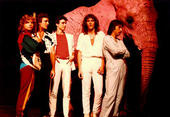Casual recognition in their own country but superstar status in Europe is the story of Saga. Formed from the core of Fludd, bassist Jim Chricton, Peter Rachon on keyboards and drummer Steve Negus recruited Chricton's younger brother Ian on guitars. Pockets was born. The group toured the local Toronto area doing bars for a few months until singer Michael Sadler left a local group called Truck to become their front man. His vocal styling blended with their progressive yet eclectic sound. It wasn't long before the group was noticed by Maze Records and signed to a deal shortly thereafter.Their self-titled debut was released in '78 and was instantly met with rave reviews for their tight, sophisticated approach. Though the single, "How Long" failed to make an impression on the charts here, it received constant airplay in Britain and Germany. Also heavy on the charts overseas was "Humble Stance".IMAGES AT TWILIGHT came out a little under a year later and again was met with compliments by the critics. Though "It's Time" and "See Them Smile" did receive airplay in the Toronto area, it failed to make much of an impression anywhere else in North America. Again though, the band's hard-edged guitar sound mixed with progressive keyboard rhythms were more appreciated in Europe, sparking an overseas tour.1980 saw the release of SILENT KNIGHT. Maturity showed in the writing, evidenced by "Don't Be Late" becoming their first gold single. The album still failed to garner the success they already enjoyed in Europe so again the band spent a good deal of their time touring England and Germany venturing into the former eastern block countries, in support of other radio hits there such as "Help Me Out" and "Careful Where You Step".Their breakthrough album in North America came in the form of 1981's WORLDS APART. Produced by Rupert Hine ("The Pina Colada Song"), it instantly saw "On The Loose" go platinum followed by "Amnesia" and "Wind Him Up", the tale of an obsessive gambler. The album also saw Rachon replaced on keyboards by Jim Gilmour, singing lead on "No Regrets". A slightly more commercially acceptable sound supported a North American tour, but for the most part, Europe was their bread and butter.The group's only live record came out in '82. Recorded in Copenhagen and Brussels, IN TRANSIT, though nothing particularly mesmerizing, did showcase the versatility of the group, spanning all four albums. Also notable was Negus' drum solo on a briefcase, called, oddly enough, "A Briefcase".HEADS OR TAILS hit the stores the next year and saw the group take a slightly heavier path with "The Flyer", but stayed true to their sophisticated roots with "Catwalk" and "Scratching the Surface". Though still not anywhere near their status in Europe, SAGA was finally getting fairly steady airplay on this side of the ocean.BEHAVIOR came out in '85 and contained the hit "What Do I Know". Although still a fine record, the record failed to hold the same magic as some of their earlier efforts. Outside projects kept the group apart until 1987's WILDEST DREAM. "Only Time Will Tell" did go gold here, but the true appreciation of their return was in Europe as always.The group cut BEGINNER'S GUIDE TO THROWING SHAPES in '89 after another hiatus. The time off proved to do more harm than good, as it turned out to be their worst seller. They put the group on hiatus again soon after.A greatest hits package was released in '93 and the attention given them saw SAGA reunite again to put out SECURITY OF ILLUSION. Now situated out of Los Angeles, the record marked a turning point for the band. Backed by the driving guitars of "Mind Over Matter" and eclectic rhythms of "Without You", the album quickly went gold in practically all four corners of the earth. They quickly followed up the next year with STEEL UMBRELLAS. True to Saga fashion, it contained the usual carefully layered rhythms and leads. GENERATION 13 was released in '96, followed by PLEASURE AND PAIN the next year. Though the record execs had long by now abandoned properly supporting the super group, both records exemplify Saga's musicianship and sheer brilliance. 1998 saw the release of their double live album, DETOURS. Capturing the group in their brilliantly live best, it was more of a treat for the die-hard fans, as no singles were released.Saga has unfortunately never received the accolades due them here at home. But in European venues, the story is quite different. The masses in places like Sweden, Germany and Holland have always had eclectic tastes. Saga's progressive melodies have always been a mainstay on the airwaves there. And though their success in North America has been fair to moderate, they've never set out to record radio-friendly songs. But they ARE Canadian ... and one of Canada's greatest exports
